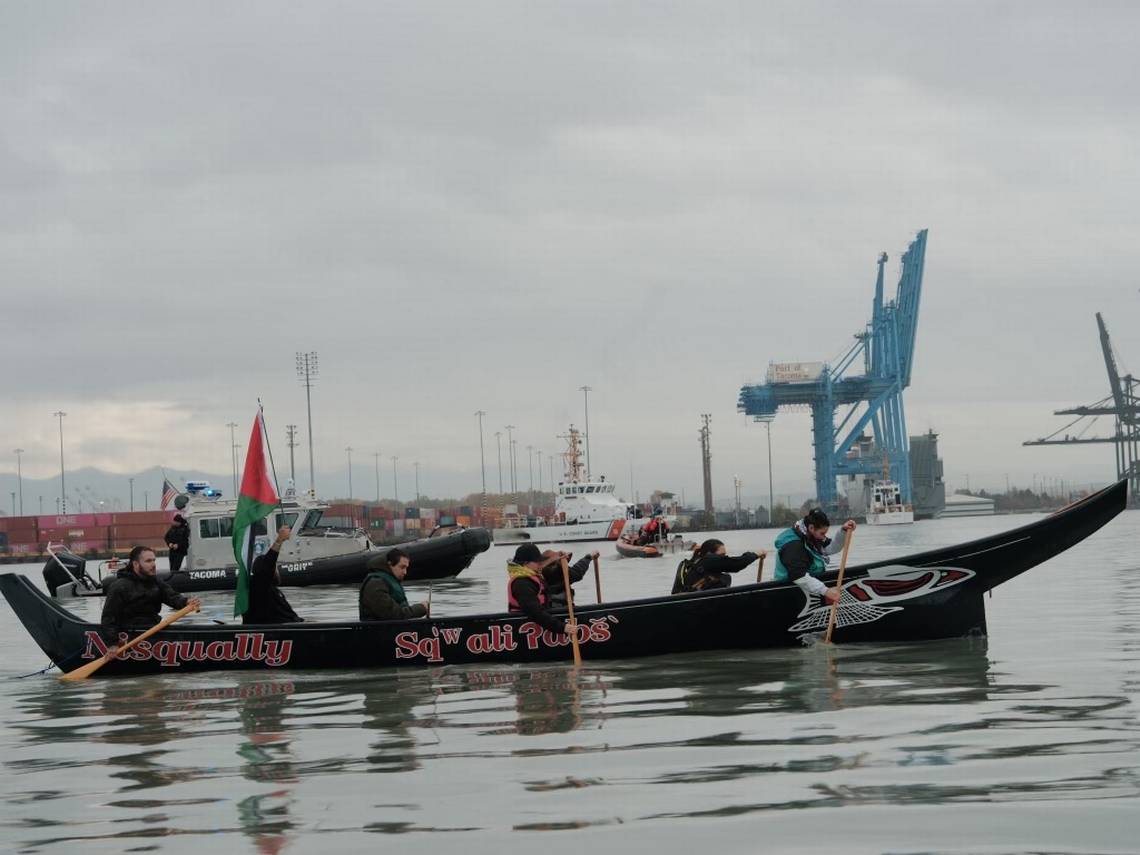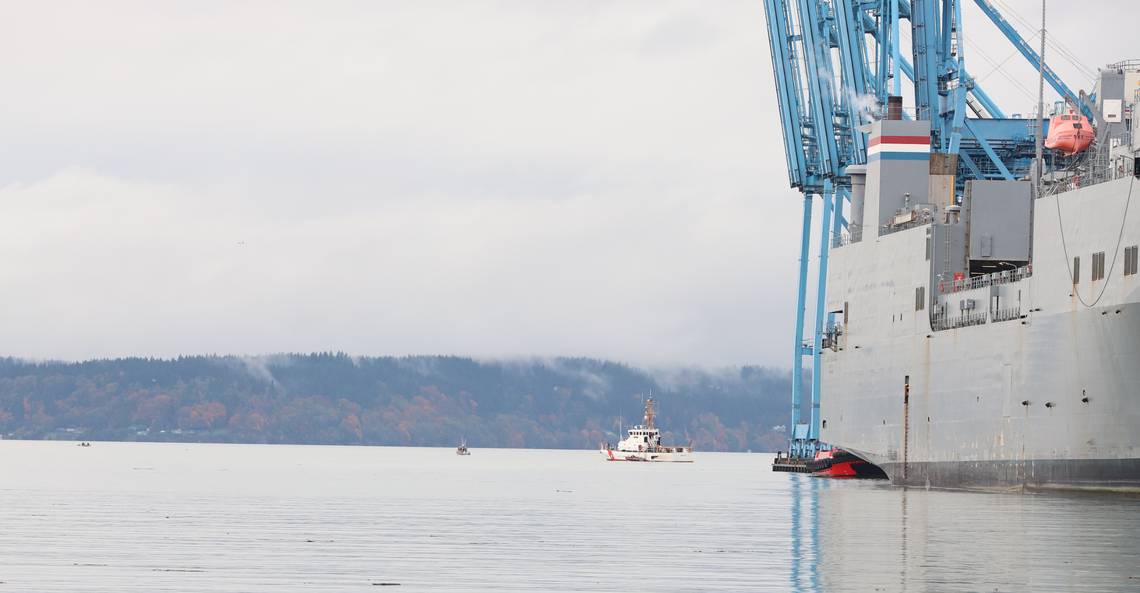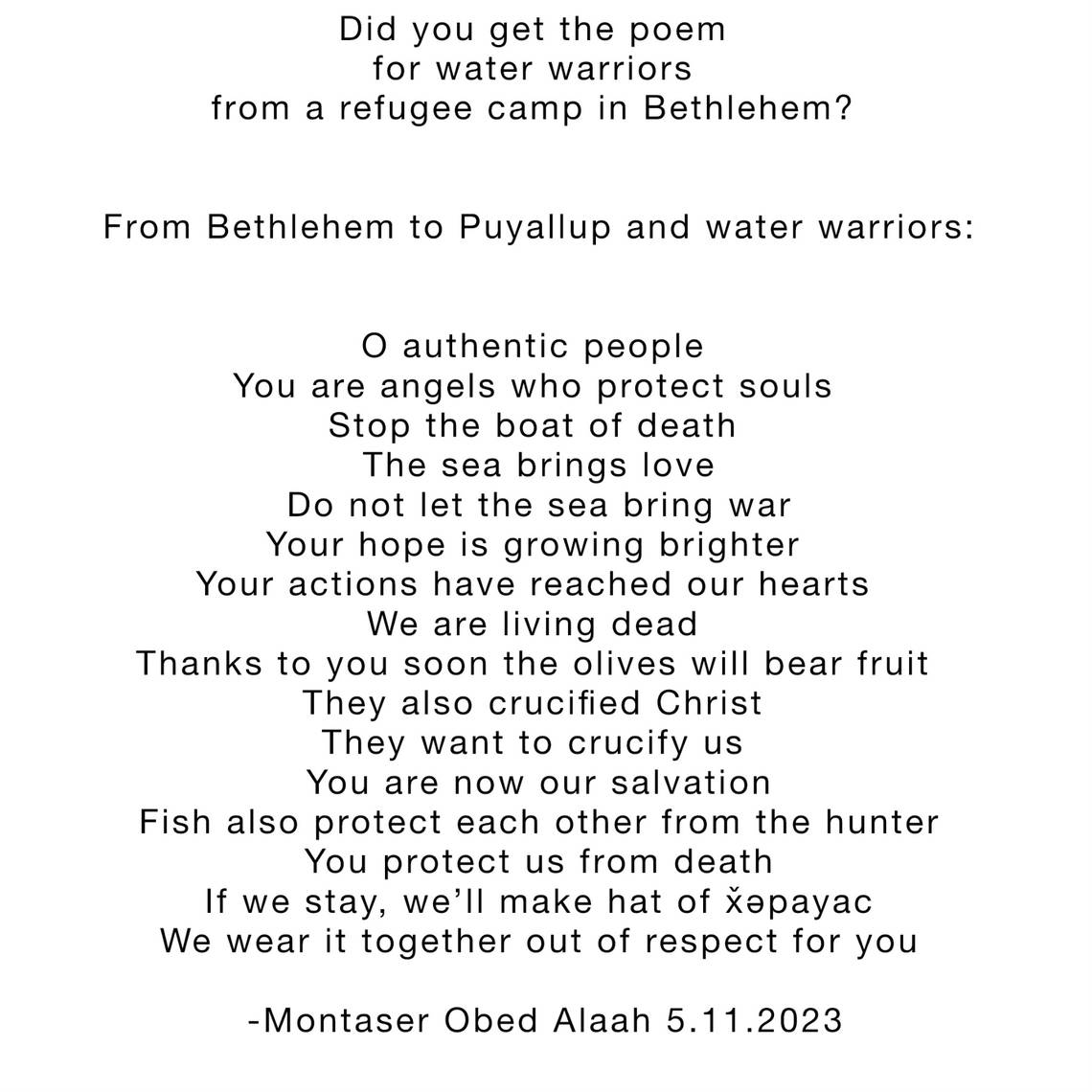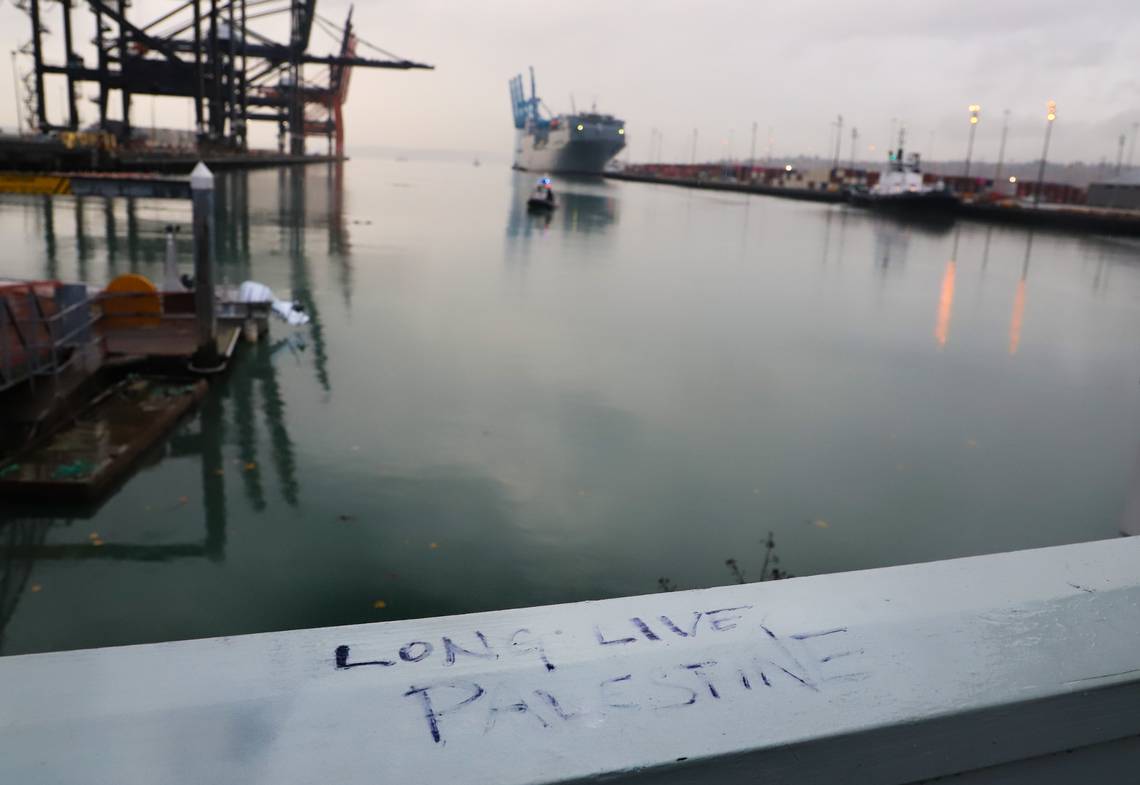
- Details
- By ROSEMARY MONTALVO , The News Tribune
A small group of protesters stepped away from the larger group and gathered at the pier railing, looking out at the large U.S. military ship docked at the Port of Tacoma in the early hours of Monday, Nov. 6, that some people was thought to be headed to Israel.
This article was originally published by McClatchy News in the News Tribune.
A U.S. Coast Guard boat and a Tacoma Police Department boat could be seen near the MV Cape Orlando at all times, but off in the distance, a traditional Native American canoe carrying seven Indigenous water warriors floated in solidarity with the protesters on the pier.
Members of the Puyallup, Nisqually, Muckleshoot, Yakama , Suquamish and Cowlitz tribes joined hundreds of other protesters during the Block the Boat protest that occurred on the traditional homelands of the Puyallup Tribe. The News Tribune previously reported that the protesters believed the MV Cape Orlando was going to be loaded with weapons and equipment that would be delivered to Israel. While some protesters used their cars to block the entrance to a pier at the port in an effort to prevent workers from loading the ship, Indigenous water warriors took to the waters in an attempt to physically block the ship from leaving the port.
 A small vessel carrying water warrior allies, left, floats near a Tacoma police boat and a U.S. Coast Guard boat that guard the MV Cape Orlando, a U.S. military ship , on Monday, Nov. 6, 2023. (Photo/Rosemary Montalvo Rosemary Montalvo for The News Tribune)
A small vessel carrying water warrior allies, left, floats near a Tacoma police boat and a U.S. Coast Guard boat that guard the MV Cape Orlando, a U.S. military ship , on Monday, Nov. 6, 2023. (Photo/Rosemary Montalvo Rosemary Montalvo for The News Tribune)
Indigenous Paddlers Protest Military Ship
Hundreds of protesters arrived at the port before dawn with signs that read “Free Palestine Now” and “Ceasefire Now.” Protesters were spread out in three different sections along 11th Street and marched in circles for 12 hours until about 4:30 p.m. Organizers announced that the ship had been partially loaded but said their protest was successful in delaying the ship for eight hours. With a day’s notice, tribal members and water warriors came together and organized in solidarity with the Arab Resource and Organizing Center (AROC), International League of Peoples Seattle-Tacoma, Samidoun Seattle, Falastiniyat. The water warriors rode in a traditional canoe that belongs to the Nisqually Tribe. Patricia Gonzalez, a member of the Puyallup Tribe and organizer of the Water Warriors Council in Puyallup, said they were only able to use one Nisqually canoe because all other tribes in the area had put their canoes away for the winter.
“At this time in the winter, we usually put our canoes away, and this is about the time we do that ceremony which is why a lot of other canoes couldn’t come out because they were already past that ceremony point,” Gonzalez said. “But Nisqually, they had a loss in their community, and they weren’t able to do that [ceremony] and postponed it out of respect, so they still had their canoes awake. it was just a beautiful blessing from the Creator that that happened the way that it did and everything fell into place the way it did.” Gonzalez said that some warriors from the Nisqually Tribe heard about the protest and offered their canoe to join the effort. “They knew that the canoe was awake, so they had the perfect opportunity to just get up and bring that canoe up, so it was a joint effort for a lot of the canoe work,” Gonzalez said. “For Nisqually, it was just something that sits on their heart to bring that fight here to be with the Palestinian people.”
Gonzalez said they chose to join the fight by canoe because of the strong connection the Puyallup people have with the water. “The waters are very, very spiritual for us. We’re connected to them. They ground us in a very humbling way. They teach us how to be patient. They teach us how to suffer up for our prayers, for good causes. When we’re out there, it’s a full prayer ceremony in itself, and each time you dip your paddle into the water, it’s a new prayer,” Gonzalez said. Gonzalez explained that the prayers that were done before and during the protest were very powerful and emotional, especially since her ancestors were victims of genocide.
“It’s very simple, we oppose genocide. There is no form, no desensitization that can happen that will make us ever be OK with that, because that is a wound for us that is still not yet healed and is still open and we are trying our best,” Gonzalez said. “When we saw that that’s what was going on, we knew we had to do the most powerful thing in our culture that we know how to do and for us that was warrior up. Get on the water and stand your ground and that’s exactly what we went out there to do.” Several demonstrations with thousands of people in attendance have occurred all over Washington, including in Olympia and in Tri-Cities, since the block-the-boat protest that happened earlier this month, all with the same message of calling for a ceasefire in Gaza. The war started on Oct. 7 after Hamas, a Palestinian militant group governing the Gaza Strip, attacked southern Israel. About 1,200 Israelis and more than 12,700 Palestinians have been killed and about 240 others were taken captive by Hamas since the start of the war, according to the Associated Press. According to a United Nation press release, Francesca Albanese, a UN expert on human rights in the occupied Palestinian territories, said “that Palestinians are in grave danger of mass ethnic cleansing and called on the international community to urgently mediate a ceasefire between warring Hamas and Israeli occupation forces.”
A Poem from Bethlehem
 A poem written by a young Palestinian man for the water warriors. (Patricia Gonzalez)
A poem written by a young Palestinian man for the water warriors. (Patricia Gonzalez)
The water warriors received a message that fueled their resistance further. Gonzalez said that Hope Hutsell, an educator and dancer from Washington, shared a poem with members of the water warriors the night before the demonstration. Montaser Abdullah, a Palestinian man living in Bethlehem wrote the poem, which conveys his gratitude and prayers for the water warriors. Hutsell first came in contact with Abdullah in late October of this year after he messaged her on Instagram after seeing her dancing a traditional Palestinian dance. Hutsell, who has worked with Indigenous communities and received her degree from The Evergreen State College through the Native Pathways Program, taught Abdullah about the Indigenous water warriors and the work that they have done. Hutsell told Abdullah the water warriors’ plans to take the demonstration to the waters, and he then offered to write them a poem. Gonzalez said the poem had an emotional impact for her and others in the group and motivated them even more to mobilize and stand in solidarity with Palestinians.
“That’s our family now, and we’re going to fight for him and we’re going to pray for him,” Gonzalez said. Rosalie Fish, a member of the Cowlitz tribe, was a puller on the canoe the day of the protest. Fish said she was at the protest because she believes that the United States is complicit in crimes against humanity and felt the need as an Indigenous person to get involved and show her solidarity with Indigenous people in Gaza. “Our demonstration at the Tacoma port was not only a symbol of solidarity but a demonstration of our sovereign power and grit,” Fish said. “The work will not be done until Gaza is free, and as Indigenous people, I am confident that our ingenuity and resistance will prevail. However, we must be involved now, and Indigenous peoples around the globe are depending on us.”
Fish also read the poem and said that it was an emotional moment for her that inspired her as a person and as an activist. She said she will go back to the poem when she feels that she is not doing enough as an ally to remember that someone in Bethlehem took the time to share gratitude for the work she and the rest of the water warriors are doing.
Threats of Arrests and $10,000 Fines
 Graffiti on a handrail on the pier at the Port of Tacoma reads “LONG LIVE PALESTINE”, Monday, Nov. 6, 2023. (Photo/Rosemary Montalvo Rosemary Montalvo forThe News Tribune)
Graffiti on a handrail on the pier at the Port of Tacoma reads “LONG LIVE PALESTINE”, Monday, Nov. 6, 2023. (Photo/Rosemary Montalvo Rosemary Montalvo forThe News Tribune)
During their time on the water, the water warriors say that they came into contact with the Tacoma Police Department and with the U.S. Coast Guard. They said both agencies tried to keep them within the boundaries designated as a peaceful protesting zone. TPD confirmed that it came into contact with the Native protesters but said the group refused to speak with anyone not part of the federal government because they are federally protected. So the Coast Guard was called in. According to both Gonzalez and Fish, members of the Coast Guard approached the canoe in their boat and told the group that they could each be fined $10,000 and arrested if they crossed the designated protest boundary. The Coast Guard could not be reached by time of publication to confirm the account. The water warriors remained in their boat.
“There was not one person that hesitated out there because we knew what we were out there for, and we knew what was at stake, and we wanted to support all of the organizers the best way we could,” Gonzalez said. Gonzalez said that they shared the protesters’ messages with TPD and with the Coast Guard and even “prayed for their warrior spirit so that their heart and mind could be cleared to make the right choices to stand up for what’s right.” The group was joined by a few non-native allies on four kayaks and on a support boat that remained in the water for four hours.
Gonzalez said the Water Warrior Council, the organizing body of the Water Warrior Movement in Puyallup, has talked about protesting on the water to protect their own waters and their land, but hasn’t been able to. The Water Warrior Movement was created to fight to restore the law of the land that Indigenous people live by, which defines the relationship between people and nature, Gonzalez said.
“We have talked about these kinds of actions and we’ve prayed about these actions for years to be able to be out on the water and defend our waters, and we never thought that it would be in somebody else’s movement, but it was so humbling and so beautiful to be a part,” Gonzalez said. Gonzalez said that seeing videos of people getting hurt or losing their lives in the conflict in Gaza evokes a lot of sadness and heartbreak because of the effects genocide had on native people that they are still dealing with today. She said she believes Native people and Palestinians are fighting for similar causes, and she along with the other water warriors were prepared to stay out on the water all night, but didn’t because they were called back in by the lead organizers of the protest.
“Unifying everybody is so awesome because there’s one thing that I’ve always thought about, when our people were victims of this act as well,” Gonzalez said. “I’m just thinking, what would it have been like if all Indigenous people of the world could stand together? There’s no way they could defeat us.”
Help us defend tribal sovereignty.
At Native News Online, our mission is rooted in telling the stories that strengthen sovereignty and uplift Indigenous voices — not just at year’s end, but every single day.
Because of your generosity last year, we were able to keep our reporters on the ground in tribal communities, at national gatherings and in the halls of Congress — covering the issues that matter most to Indian Country: sovereignty, culture, education, health and economic opportunity.
That support sustained us through a tough year in 2025. Now, as we look to the year ahead, we need your help right now to ensure warrior journalism remains strong — reporting that defends tribal sovereignty, amplifies Native truth, and holds power accountable.
 The stakes couldn't be higher. Your support keeps Native voices heard, Native stories told and Native sovereignty defended.
The stakes couldn't be higher. Your support keeps Native voices heard, Native stories told and Native sovereignty defended.
Stand with Warrior Journalism today.
Levi Rickert (Potawatomi), Editor & Publisher
